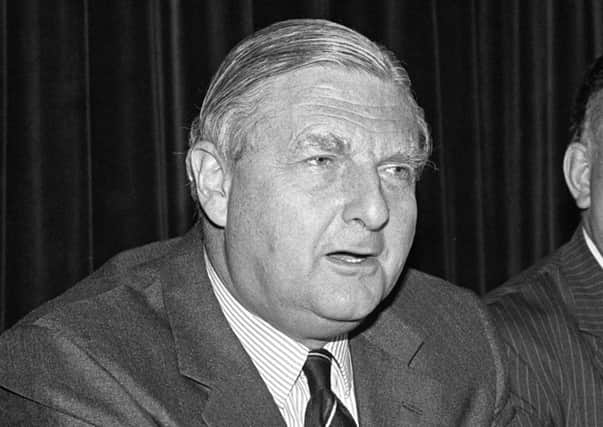Obituary: Sir Patrick Mayhew, lawyer and huntsman who helped broker NI peace


He was a key figure in the December 1993, Downing Street Declaration, formulated by then prime minister John Major and then Irish taoiseach Albert Reynolds, which led to the IRA ceasefire the following September.
And his selectively leaked letter – as solicitor-general in January 1986 – setting out the background to the bitter Westland Helicopters dispute, led, through no fault of his own, to the resignations of both the then defence secretary, Michael Heseltine, and the trade and industry secretary, Leon Brittan.
Advertisement
Hide AdAdvertisement
Hide AdIt even, for a few dramatic hours, imperilled the prime minister, Margaret Thatcher, herself. But she survived.
Lord Mayhew would have regarded himself on the “liberal” wing of the Conservative Party, but he was not the kind of politician who could easily be labelled.
Party intrigue did not attract or concern him. He was a man who, with the discipline that goes with being a Queen’s Counsel, concentrated on the job in hand to the exclusion of all else.
Patrick (Paddy) Barnabas Burke Mayhew was born on September 11 1929, and attended Tonbridge School and Balliol College, Oxford, where he was president of the Union.
Advertisement
Hide AdAdvertisement
Hide AdBefore that, he did his National Service as a cavalry subaltern in the 4th/7th King’s Dragoon Guards, to which he remained fondly attached throughout his life. He regularly wore the regimental tie.
He was also a sporting man in his youth and regularly hunted with the Beaufort.
He read for the Bar at the Middle Temple and was called in 1955. He took silk in 1972, still in his early 40s, before he entered the House of Commons in 1974 as MP for Royal Tunbridge Wells, a seat he held for many years.
As soon as Mrs Thatcher came to power, in 1979, he was appointed employment under secretary, followed by a period as minister of state at the Home Office.
Advertisement
Hide AdAdvertisement
Hide AdAfter the 1983 general election, he was appointed solicitor-general, under Sir Michael Havers who was then attorney-general. But during critical periods, Sir Patrick, as he had become, had to act as attorney-general while Sir Michael was ill.
During the Westland row, Heseltine was the sole Cabinet member who wanted a European rescue package for the ailing helicopter company. The rest of the Cabinet favoured an American package.
Heseltine wrote to the European consortium in terms which Mayhew warned him in a private and entirely dispassionate letter were seriously misleading.
But those parts of the letter which were highly damaging to Heseltine were leaked on January 6 1986 to the Press Association by Colette Bowe, who was Leon Brittan’s press officer.
Advertisement
Hide AdAdvertisement
Hide AdThe leak rocked the Government, and Mayhew, who had acted throughout with constitutional precision, furiously threatened to resign unless the perpetrators of the leak were punished.
When Sir Michael became lord chancellor, Mayhew became attorney-general and was involved in a series of contentious issues. These included demands for the extradition of terrorist suspects from the Irish Republic, and his decision not to prosecute in alleged shoot-to-kill cases.
This brought him unpopularity in Dublin and a reputation as a disdainful, high-handed and haughty man.
Mayhew was also involved in the Spycatcher affair, heading the government’s campaign designed to block publication of the memoirs of former MI5 agent, Peter Wright.
Advertisement
Hide AdAdvertisement
Hide AdHowever, surprisingly for a lawyer, the promotion – or rather change of job – that Mayhew longed for more than anything else was to become Northern Ireland secretary, a yearning granted him after the 1992 general election.
Throughout this period he remained typically unemotional and steadfast through some of the most vicious terrorist attacks the Province had seen in 25 years of the troubles.
And he was particularly outspoken about Dublin’s continued territorial claim, in its constitution, on the six counties of the North.
At this stage it came to light that there had been secret contacts between the government and the IRA, and Mayhew published a lengthy dossier of the written exchanges.
Advertisement
Hide AdAdvertisement
Hide AdBut he worked assiduously with the British prime minister, with Mr Reynolds and with Dick Spring, the then Irish foreign minister, to achieve the Downing Street agreement of December, 1993.
There was a frustrating delay of some nine months while the IRA continually sought “clarification” of the document: a plea which Britain regarded not as a request for clarification but for renewed negotiations which Whitehall was not going to allow.
But finally the breakthrough came, with the IRA ceasefire and the subsequent lifting of the ban on the broadcast voices of IRA and other paramilitary sympathisers.
And although hard-line Unionists were deeply suspicious it appeared as though Sinn Fein was coming towards the legitimate constitutional fold of Ulster politics.
Advertisement
Hide AdAdvertisement
Hide AdMayhew was normally impeccably diplomatic, but there was one rare and uncharacteristic gaffe for which he had to apologise publicly and profusely.
He was with the prime minister in June, 1993, awaiting the start of a performance in Northern Ireland of Donizetti’s Lucia di Lammermoor. When a reporter questioned him about a grenade attack that day in Belfast which had injured nearly 30 people, he quipped: “No, nobody dead. At the end of this opera, everybody’s dead.”
Mayhew said later that he much regretted any distress he had caused by this remark.
He was made a life peer in 1997.
He is survived by a widow and four sons.